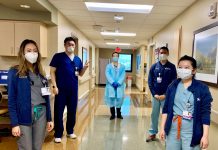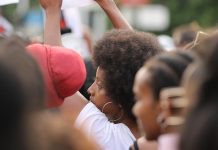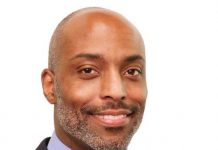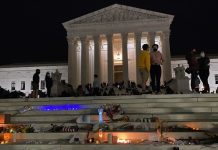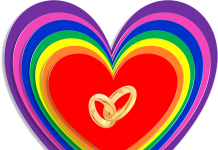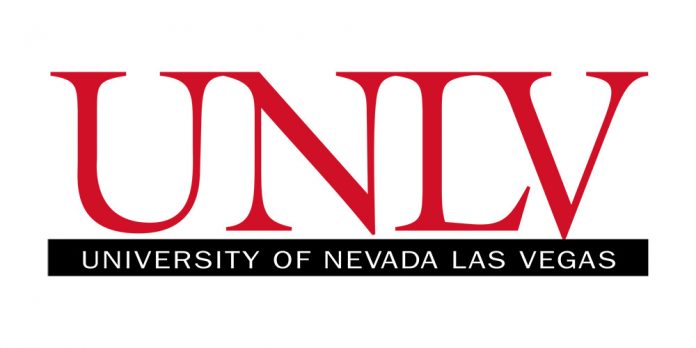By Kristen Peterson
On the fifth floor of Lied Library, a small group of students occupy a center table, bemoaning the agonies of organic chemistry and celebrating “Buffy,” now on Hulu, while knitting and eating snacks. Normally they’re in a room at the Student Union, but they gave the space up for rehearsal. The drag show is that weekend, “kings, queens and non-binary royalty.” This is the pre-meeting to the Tuesday meeting, a two-hour knitting (but knitting not required) social for members of UNLV Spectrum.
“We were originally the Gay Academic Union, formed in 1983. Then they formed a heterosexual society because they hated us,” says Sam G, who does public relations for the group. Others around the table, all young faces, nod, knit, chew and listen. They’re well steeped in the group’s history. They visit the LGBTQAI Resources in the UNLV Library’s Special Collections, each semester as part of a Spectrum activity. They know who historian Dennis McBride is, what Stonewall was and who gay rights advocate Marsha P. Johnson was.
They know about all the accomplishments and see that much more needs to be done; that the general American public still argues their public restroom use, their military service, their workplace visibility, their health care and, in some cases, their existence.
Moreover, with all of their knowledge of the queer past, these students are in a unique time of their own, an era in transformation where LGBTQ is no longer just that. Introductions might include preferred pronouns. Gender and sexuality are highly fluid and are not to be bluntly assumed.
The queer narrative is evolving rapidly and these young students, many in their early twenties are on the forefront of change. Despite various facets of queer identity playing out in popular culture and in different circles, the rest of society, still struggles to even digest the dialogue, if it crosses their radar at all. They’re carrying the new banners into mainstream society.
“I’m Ace,” says Adriaun B, when the third-year biology major was asked about which letter of the Q alphabet applies. “I claim hetero, sapphic, but I identify more with the LGBTQ community than with the black community and the white community. I’ve always been an LGBTQ ally, my whole life.
“Asexuality leads to another conversation,” Adriaun says of the world outside the group. “They just don’t get it.” Sam G.: “I’ve known about my own gayness for a long time. I grew up in an accepting environment. So it was not difficult. The struggles I have, come from other, different places, the intersection of being disabled and queer. I just care a lot about making sure that other people have a safe place to exist.”
“You’re succeeding,” interjects Theo Parrish, with a warm kind intone. Parrish, a trans, who is fl uid in sexuality and gender.
At 6 p.m., they’ll go to the Student Union, room 209, for the UNLV Spectrum Tuesday night meeting, in which about 20 of the 93 members attend weekly. Tonight, it’s a workshop and interactive presentation on sexual health, that includes listening and sharing and plenty of other ground rules. Last week it was open-mic karaoke. Prior to that it had been the “Secret Gay History of UNLV.” There was also the showing of “Pose!” for Black History Month, “Gayme Night” and “Craftivism.”
Regardless of the activity, the multicultural organization’s mission is to provide a safe place, offering education and support for all students and faculty whether bi, gay, intersex, trans, cis, lesbian or somewhere in between. It’s anonymous. Photos aren’t allowed at meetings. Conversations within the group aren’t to be loosely continued elsewhere on campus. Cis het eros are welcome. All are welcome.
“How can we exclude cis people when they might not even know they’re queer,” says Veronica Buchanan, who was cis and is now trans-identified, sapphic and A-sexual.
“We have so many horror stories. Every person who comes in, comes in for a safe space from parents, from family. There are always people trying to hold you down or ridicule you.”
Violet, a student who identifies as trans, joined the group this semester, and recently came out to their parents and changed their online gender identity: “This has been a safe place to explore myself,” Violet said quietly. “Without it I would be 10 steps back.”
During a break in the evening’s activities, Buchanan and I step into the hallway and continue our conversation about the group and about the great diversity of so many different, but like-minded, people. We share mutual appreciation for someone leading tonight’s group, when Buchanan says without missing a beat, “They use the pronouns they/them.”
I smile and acknowledge my own slip of the tongue and we begin to wrap up our conversation about the world and its uncertain current events.





